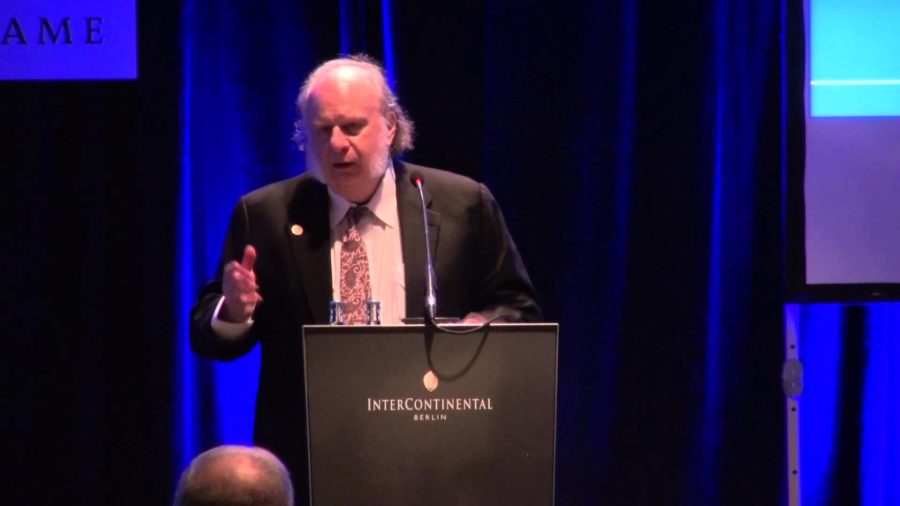Thank you. I’m very happy to be here on behalf of my dad to accept this honor. He would be very happy that there was an Internet Society, someone shepherding—although that’s probably too strong a word—the evolution of the Internet, which is probably more unmanageable or predictable than shepherding cats. And I think he would be bemused that there was an Internet Hall of Fame. I’m pretty sure he didn’t think of that in his pioneering thoughts.
Also, he would say to you that you are all wrong and that he never should have been chosen to receive this award. He was a fairly humble guy and would sit here—and it’s been a recurring theme—he would begin naming the names of all the people who really did the work. And he would sort of just say, “I was there.” And he would list a lot of people. When he was alive, I’d been to some award ceremonies in which he received awards, and it was kind of boring because he sort of disappointed the audience and just listed lots of people. And it’s perhaps because his time in government taught him something that he didn’t, I don’t think, start out knowing, being an engineer scientist— But he kinda got the idea about being politically and socially correct and congratulating everybody else but himself.
My dad was, I guess you would say, an out-of-the-box thinker. In fact there are some people who thought he never was in the box. And I think a lot of what he did was serendipitous. He went to Bolt Beranek and Newman after starting the experimental psychology program at MIT as a person who was known for his experimental psychological work in hearing, audition, and hearing and human factors. And he worked on things like what kinds of signals— His office at BBN had gongs, noisemakers, all kinds of things that would make sounds, in the spirit of figuring out what’s good to tell a pilot that the plane’s on fire—something that would penetrate and be successful in letting people know what was going on.
In the process—and this is a time when BBN was an acoustics company. They designed Royal Philharmonic Hall and the New York facility. And he was lucky to be there when they first got computers. And this utterly transformed him from being a psychologist. He became infatuated— At that time, you were fundamentally working with a personal computer. Because it was unshareable. And I remember as a kid going in there, particularly on Saturdays. I had a job of rolling up the punched paper tape, putting a rubber band on it, and putting it back on the pegboard. I was paid five cents a day, and it was nice that the BBN vending machine dispensed candy bars for exactly one nickel.
But he really was transformed by this experience of being one on one with a computer, and had the idea of the potential of human augmentation by having a symbiotic relationship with a computer. And that evolved to a very strong belief in what he would call the Intergalactic Network, which would take the knowledge of humankind and make it freely and openly accessible to everyone in the world. A somewhat idealistic and optimistic position, perhaps, but one that gained tremendous momentum.
And again as luck would have it, for some reason somebody thought he should come to the Information Processing Techniques Office at ARPA. And this was giving money to an out-of-the-box person who became not only a proselytizer for this vision, but a guy who happened to have cash. And he was somewhat of a talent spotter, and he would find some smart group in a university and say— But he had money to give people. All kinds of strange people. All kinds of people who seemed to share his vision. And I think that was the luck of it all. They could’ve appointed somebody else to IPTO and not had the same result. Maybe a better one, maybe a different one, but it’s hard to see that.
But because he was an evangelist, he was a funder, he would stand up here and say, “No. I didn’t do it. You know…all these people that were brilliant, and did it. And let me tell you all their names.” And then you’d get bored. But he was very happy about how the Internet evolved to a point— But he didn’t live long enough to see the World Wide Web, and to see the dark forces of venture capital and the entertainment industry…all kinds of actors becoming dominant players in the evolution of the Internet. Moreso at the time, anyway, in this period than technology in some cases.
I think at this point he would be concerned about the attacks on the fundamental notion of taking humankind’s knowledge and making it available to everyone. And he would be disturbed by nation-state interdiction of their Internet. He would be dismayed by government surveillance. And the commercialization and partitioning that impeded this free flow. And I guess it’s up to the succeeding generation of people, the Internet Society and its followers, to make sure that we have a good outcome. But in any case, enough said. I really appreciate it very much that you’ve bestowed this award on him. And thank you very much.
Further Reference
Topics for Discussion at the Forthcoming Meeting, Memorandum For: Members and Affiliates of the Intergalactic Computer Network, by JCR Licklider
JCR Licklider profile, Internet Hall of Fame 2013
